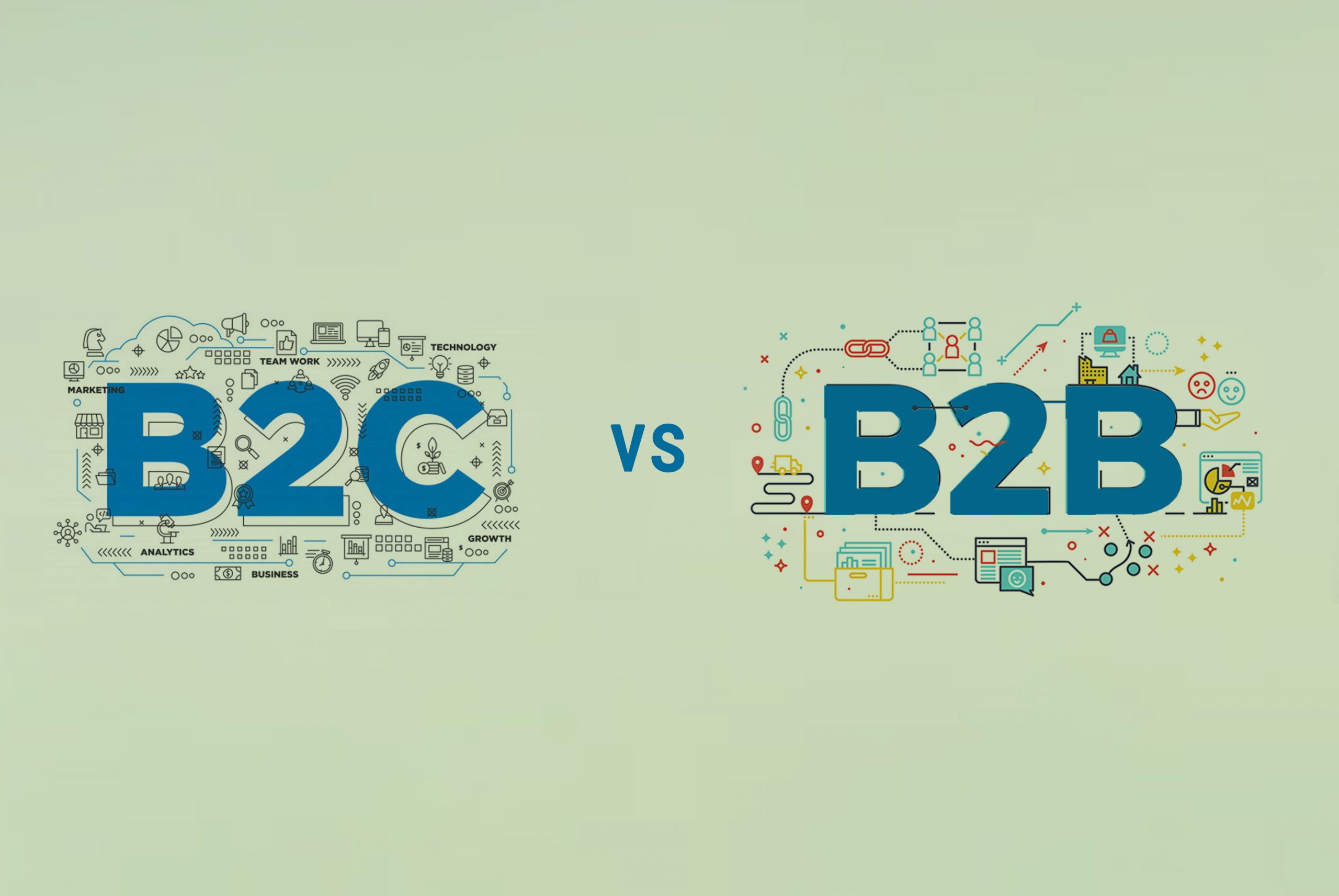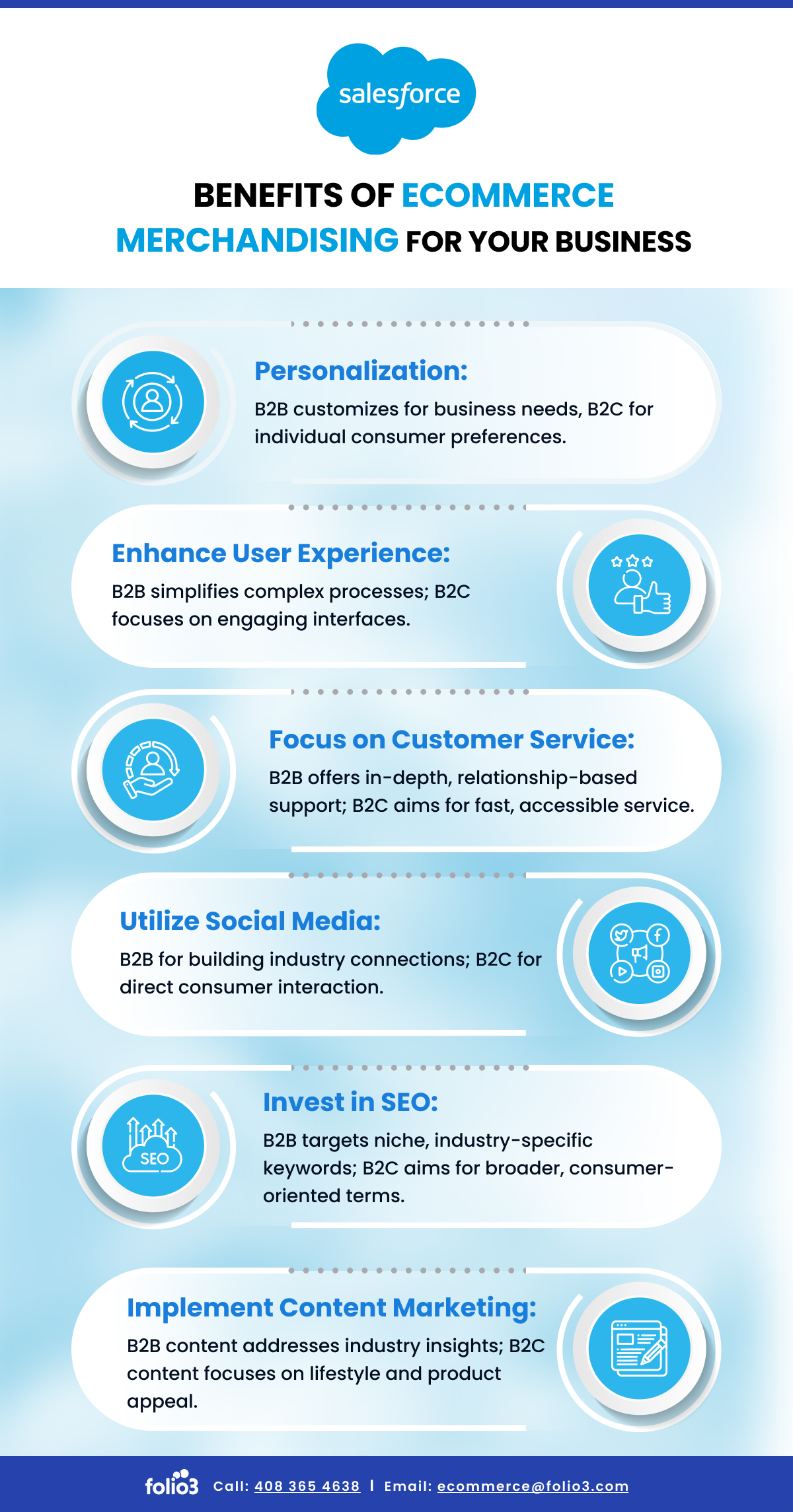B2B and B2C ecommerce models operate on the same online platform, but they differ in their approach and functionality. When you look at the difference between B2B and B2C e-commerce, you will find out that they are more different than you realize.
Let’s explore the B2B vs. B2C ecommerce models and see how they can be compared in terms of customers, products, and services offered.
B2B vs. B2C Ecommerce: A Quick Comparison

On the other hand, B2C (Business-to-Customer) ecommerce revolves around businesses selling directly to individual consumers. This is marked by a larger customer base, shorter transaction cycles, and a greater emphasis on marketing to individuals. Transactions are often simpler, featuring standardized products, transparent pricing, and a seamless online shopping experience.
B2B vs. B2C Ecommerce: Which Is More Complex?
Both B2B vs. B2C ecommerce have their own unique complexities that businesses must navigate. However, when it comes to which one is more complex, the answer may not be straightforward.
- B2B ecommerce involves more orders, complicating logistics and inventory management, whereas B2C focuses on single-item purchases.
- In B2B, the sales cycle is longer, with multiple approval stages, and more decision-making is involved compared to the simple process in B2C.
- B2B transactions involve price negotiations based on volume or relationships, unlike fixed pricing in B2C.
- B2B platforms are technically complex, supporting features such as volume discounts and customer-specific price lists. In contrast, B2C platforms prioritize user-friendliness for individual consumers.
- B2B buyers often require detailed product specifications, custom quotes, and personal assistance, leading to more complex customer service, whereas B2C is straightforward, self-service purchasing.
B2B vs. B2C Ecommerce: Salesforce Commerce Cloud
Salesforce Commerce Cloud is a leading solution in the digital commerce space that offers unique modules, where both Salesforce B2B Commerce Cloud and Salesforce B2C Commerce Cloud aim to sell products.
B2B Commerce Salesforce is the ultimate solution for all your business transactions. It makes large-volume purchases easier and effortlessly manages complex relationships. Moreover, it is all about business efficiency, offering features like custom pricing, account hierarchies, and seamless integration with enterprise systems.
On the contrary, the B2C Salesforce Commerce Cloud is tailored for individual shoppers and focuses on creating personalized online journeys. This platform goes beyond transactions, prioritizing seamless, enjoyable online shopping experiences that boost customer satisfaction and loyalty.
B2B vs. B2C Ecommerce: Which One is Good For Your Needs?
The most suitable e-commerce model aligns with your business requirements. When choosing between B2B and B2C ecommerce models, consider their respective features, advantages, and disadvantages.
B2B and B2C ecommerce operate on different levels, each catering to its unique set of requirements and dynamics. B2B ecommerce, which centers around transactions between businesses, is characterized by high-volume purchases and a complex decision-making process. It prioritizes relationship-building, customization, and operational efficiency.
In contrast, B2C ecommerce is designed to facilitate direct sales to individual consumers. It features smaller and often more straightforward transactions. The focus here is on creating strong branding and delivering personalized shopping experiences.
The choice between the two hinges on several factors: your target audience, the scale of your transactions, and the complexity of your products or services. Opt for a B2B model if you operate within a business-to-business landscape with industry-specific needs. On the other hand, a B2C model would be more appropriate if your business aims for direct engagement with consumers, emphasizing branding and personalized shopping journeys.
B2B vs. B2C Ecommerce: Strategies to Grow Your Business
Personalization
Personalization plays a crucial role in enhancing user experience. For B2B, this can be achieved by offering customized pricing options tailored to individual business needs. On the other hand, in B2C, personalization can be further amplified by incorporating product suggestions based on previous purchases, ensuring that customers receive tailored recommendations.
Enhance User Experience
A user-friendly interface and easy navigation are key to increased customer satisfaction. This is particularly important in B2C ecommerce but holds value in B2B as well. A smooth and personalized shopping experience will encourage customers to return for future purchases, ultimately leading to higher conversion rates.
Focus on Customer Service
Excellent customer service can differentiate your business from competitors. For B2B, this could mean having a dedicated account manager. In B2C, this could translate to responsive customer support and easy return policies. By prioritizing customer service, you can build brand loyalty and increase customer retention.
Utilize Social Media
Social media has become a powerful tool for businesses to connect with customers. In B2C ecommerce, platforms like Instagram and Facebook can be used to showcase products and promotions, while in B2B, LinkedIn can be used to network with potential clients and showcase industry expertise. Both ecommerce businesses can benefit from an active social media presence.
Invest in SEO
SEO helps improve your site’s rank on search engines, making it easier for potential customers to find your business. With B2C, this could mean targeting specific keywords and optimizing product descriptions. In B2B, SEO can help businesses establish themselves as thought leaders in the industry through content marketing and guest posts on relevant websites.
Quality content can attract and engage customers, as well as improve SEO. This strategy can be effective in B2B vs B2C ecommerce. In B2C, content marketing can focus on product reviews and tutorials, while in B2B, it can be used to share industry insights and establish credibility. By consistently creating valuable content, businesses can increase brand awareness and attract potential customers.
B2B or B2C Ecommerce for Your Business
Understanding and applying effective strategies in both B2B vs. B2C ecommerce matters because it ensures businesses meet the unique needs of their clients or customers.
Whether building relationships with other businesses or creating personalized experiences for individual consumers, these strategies promote growth and satisfaction. Adapting to evolving market demands, embracing technology, and prioritizing customer-centric approaches are essential for staying competitive and successful in the ever-changing world of e-commerce.
FAQs
Is Salesforce B2B or B2C?
Salesforce offers solutions for both ecommerce businesses. Salesforce B2B commerce cloud is designed for companies dealing with other businesses, while Salesforce B2C commerce cloud is particularly for individual consumers.
What Is the Difference Between Salesforce B2B and B2C?
The primary difference between Salesforce B2B and B2C commerce cloud lies in the nature of their target markets. Salesforce B2B commerce cloud caters to large-scale transactions typically involving multiple stakeholders, while Salesforce B2C commerce cloud is equipped with simpler, direct-to-consumer transactions.
Why Is B2C Better Than B2B?
It’s inaccurate to generalize that B2C is better than B2B or vice versa. Each has strengths and is better suited to different business models and objectives. B2C typically involves a faster sales cycle and more consumers, while B2B transactions are usually larger in scale and value, with a more complex decision-making process.
Which One Is More Profitable, B2B or B2C?
Profitability depends on multiple factors, including your business model, cost structure, pricing strategy, and target market. B2B transactions often involve higher-value contracts and can lead to long-term profitable relationships. In contrast, B2C transactions, smaller in value, can generate substantial profits due to the volume and speed of transactions.

Hasan Mustafa
Engineering Manager Salesforce at Folio3
Hasan Mustafa delivers tailored Salesforce solutions to meet clients' specific requirements, overseeing the implementation of scenarios aligned with their needs. He leads a team of Salesforce Administrators and Developers, manages pre-sales activities, and spearheads an internal academy focused on educating and mentoring newcomers in understanding the Salesforce ecosystem and guiding them on their professional journey.
